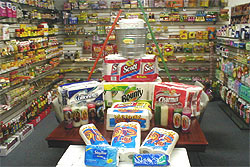 |
 |
 |
 News Around the Republic of Mexico | October 2005 News Around the Republic of Mexico | October 2005  
Dollar Stores Take Off in Mexico
 Wire services Wire services


| | The format is still in its infancy here, with fewer than 1,000 stores nationwide compared with more than 17,000 in the United States. |
As sales gimmicks go, "11.3 pesos" doesn't quite have the ring of "99 cents."

But Mexican shoppers such as Jaime Plata don't seem to care. Savings, not slick marketing, draw him to Waldo's Dólar Mart de México, this nation's largest chain of so-called dollar stores.

On a recent afternoon, the nightclub owner trolled the aisles of a Waldo's store in the capital's middle-class Anahuac neighborhood. Bottles of apple juice, priced at two for 11.3 pesos, or about US1.05, were piled in his cart, along with candles and picture frames.

"They have a wide variety, and the prices are tough to beat," said Plata, who said he visited the store at least three times a week.

One-price retailing is winning converts south of the border as Mexicans discover the joys of snagging mini-blinds, underwear and a six-pack of root beer for about a buck each.

Like their U.S. cousins, the Mexican chains offer food, beauty products, cleaning supplies and other staples, along with a grab bag of name-brand goods and novelties.

How about a six-character nativity scene, complete with all three wise men, for 11.3 pesos?

"There is magic in selling a US3 item for US1," said Filiberto Jiménez, director general of Waldo's, whose stores are already stocked with Christmas merchandise. "If you can do that consistently, you've got yourself a business."

Growing Market

The format is still in its infancy here, with fewer than 1,000 stores nationwide compared with more than 17,000 in the United States. Dollar stores have multiplied rapidly in the United States, with nearly 5,300 U.S. locations added from 2000 to 2004, a 46 percent jump, according to statistics from AC Nielsen. The U.S.'s largest chain is Tennessee-based Dollar General Corp., with more than 7,600 stores. Other players include Family Dollar, Dollar Tree, Fred's and Commercebased 99 Cents Only.

Dollar stores are small, convenient and quirky in contrast to retailers such as Wal-Mart Stores Inc. with their gigantic parking lots, cavernous stores and massmerchandised sameness. The one-price stores rely on suppliers' close-outs and overstocks. Many customers find the everchanging inventory irresistible, rifling through the shelves with the enthusiasm of children on a treasure hunt.

Although half of U.S. households with incomes above US70,000 shop at dollar stores, bedrock clients are workingclass households with large families. That customer profile fits well into the demographics of Mexico, where nearly 60 percent of workers earn less than US250 a month.

"It makes perfect sense" that the stores are catching on in Mexico, said Todd Hale, a senior vice president at AC Nielsen. "Rich people love low prices, poor people need low prices." Most workers toil in the informal economy and get paid by the day. Mexico City retail analyst Marc Monsonego said these low-income people were intimidated by giant club stores that require them to pay membership fees and buy products in bulk.

Easy Access

Monsonego said dollar stores, with their tidy displays and layouts that let customers get in and out quickly, are snazzier versions of mom-and-pop corner stores where millions of blue-collar Mexicans shop.

"People are not afraid of going into these dollar stores because they know how much they'll spend," said Monsonego, a managing director at Neoris, a consulting firm. "All the chains are looking at that business."

Waldo's is the nation's largest chain with 180 stores, including its recent purchase of 23 Solo un Precio (One Price Only) stores from Grupo Carso. Competitors include El Mundo de 3 Pesos (3Peso World) with 155 stores, La Tienda de Dólar (The Dollar Store) with 40 shops and El Punto Mágico (The Magic Point) with 40 stores.

Wal-Mart de México, the nation's largest retailer and a subsidiary of Bentonville, Ark.based Wal-Mart, also has jumped into the fray. It operates a dollar department called Prichos inside 264 of its stores.

Mexico City-based Waldo's has its roots in the United States. Texas oil billionaire Robert Rowling is a major shareholder of the privately held company, as is Scott Beck, former chief operating officer of Blockbuster Entertainment Corp. and founder of Boston Chicken Inc., who serves as Waldo's chief executive.

Formerly headquartered near Chicago, the chain opened a few U.S.stores in 1999 along with a location in Tijuana. Beck said the concept did so well south of the border that Waldo's decided to abandon the crowded U.S. field and focus solely on Mexico.

More Stores in 2006

Beck would not disclose sales or profits. But he said the company planned to add 85 stores in 2006.

"Our objective is to develop a very strong business in Mexico and use that as a launching pad to be able to go into other countries in Latin America," said Beck, who now lives with his family in the Mexican city of Colima.

So what's the deal with 11.3 pesos? Waldo's pricing isn't as arbitrary as it appears. Mexico charges a hefty 15 percent valueadded tax on most non-food items. So that 11.3 pesos comes out to exactly 13 pesos once the tax is applied. Rather than advertise food at one price and non-edible goods at another, Waldo's uses the lower figure to promote all of its merchandise. Shoppers say it adds up to a good deal either way.

Most chains round to the next peso or half-peso because the price looks good on a sign and it's easy for customers to calculate. Everything costs 10 pesos at El Punto Mágico, for example. At Prichos it's 12.5 pesos. | 
 | |
 |



